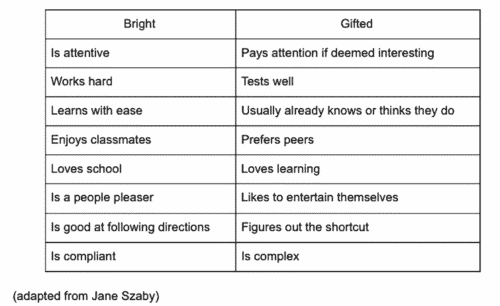Table of Contents
Oftentimes, gifted kids are referred to as being bright. We want to be careful when labeling them with this because it is not always accurate. You see, a bright child is someone who has the following qualities:
- Is attentive
- Works hard
- Learns with ease
- Enjoys peers
- Love school
- Is a people pleaser
- Is good at following direction
- Is compliant
Bright vs. Gifted
That’s a pretty good list and one that any teacher would give part of their paycheck if all students in their classes were of this quality. But this is not necessarily the gifted child. In fact, many times the gifted child can have a clear distinction to the quality:

Understanding a Bright Child and Gifted Child
There are a few clear distinctions between the two. For instance, the bright child is a hard worker, while the gifted child tests well. That does not mean that all gifted children do not work hard, but what it does mean is that some gifted children do not have to work hard in order to achieve good grades. As a result, some of these gifted children have learned not how to work hard, but how to hardly work. And who can blame them?
Another distinction would be the bright child enjoys classmates while the gifted child prefers peers. Some would liken those two to be the same, but they are very different. Classmates 99% of the time are the same age. This is because in the United States all children enter kindergarten around the age of 6, which means they are 1st graders at 7, and so on and so forth until they graduate at age 18. That means that in a classroom, the kids are the same ages. Bright kids tend to work well with these kids because they are people pleasers as well as being very agreeable. Some gifted students, on the other hand, take on what James Delisle calls the “better than” instead of the “better at” attitude. In other words, because the gifted child is better at much of the academics because of his abilities, he takes this a step too far and feels as though he is better than those classmates. Part of that is also not suffering fools gladly. If the gifted child thinks he is better than his classmates, he does not respect their input and thus might have difficulty making friends. Sometimes it can be the other way around, and his classmates are not very accepting of him because he thinks different and talks different. This is why you often see gifted students talking with their teachers; these adults are the only ones that they can have a conversation with.
A Love for Education
A third distinction is the love of school and the love of learning. Again, some would think these to be one in the same. After all, isn’t school where one goes in order to learn? Thus if you love to learn, you love school. Sometimes this is certainly the case, but there are those students who do not love school. In fact, they resent it and dislike going. This might be because they have become bored by school, or there is a lack of challenge, or that they are bullied because of their abilities. For whatever reason, the child no longer loves school and may become an underachiever who does not perform to the level of their ability. Make no mistake, though; this child still loves to learn. She just prefers to learn what is interesting to her. She might not turn in her homework and yet spends hours on Youtube trying to figure out how to bake a particular dish, or she might do poorly on tests and yet spends a lot of time refining her poker game. The effort to learn is still there. It just isn’t what you would characterize as traditional learning. Because of this, many times, gifted students determine what is worthy for them to learn. If they deem something not to be worthy, they will not give their best effort and may even do poorly. A bright child is always going to work hard to get good grades, even if it is something they don’t want to particularly learn about.
Understanding Compliant vs. Complex
A final distinction between bright and gifted is that the bright student is compliant while the gifted one is complex. This becomes a challenge for teachers. Working with students who follow directions and do what is asked of them is very nice and certainly makes the job easier. It does not always lead to great learning, however. Compliant students do not question what is being taught to them and thus only can go as deep into the material as it is presented by the teacher. A gifted child, on the other hand, will question things. They typically want to engage their minds and so will explore something that causes them to become curious. By doing so, they are allowing the lesson to become much more complex and engages those higher levels of thinking. Although this is better educationally, it is not necessarily better for discipline and ease of the class.
There are many people who carry the stereotype that having the gifted students in class is a piece of cake because they are all the “good” kids. This is certainly more true of the bright children but not the gifted. Someone who teaches gifted is going to have to be on their toes much of the time for students that are challenging them.
Read more from Todd at Stanley at edCircuit and The Gifted Guy.
Subscribe to edCircuit to stay up to date on all of our shows, podcasts, news, and thought leadership articles.






